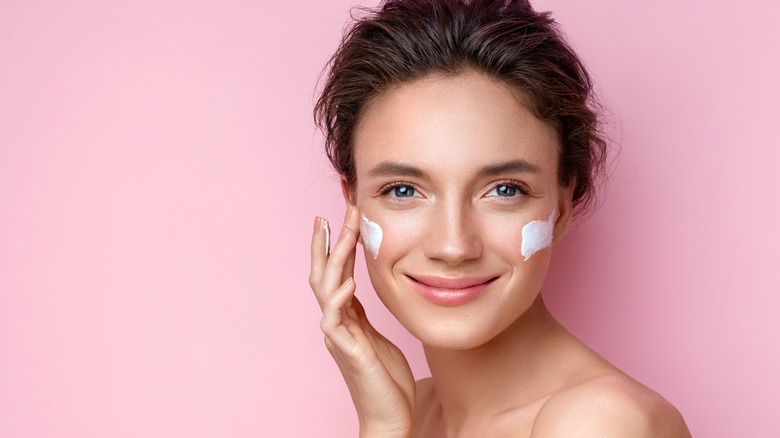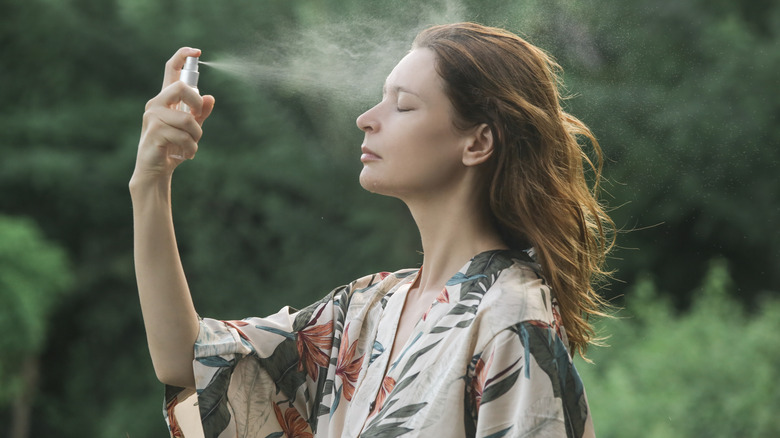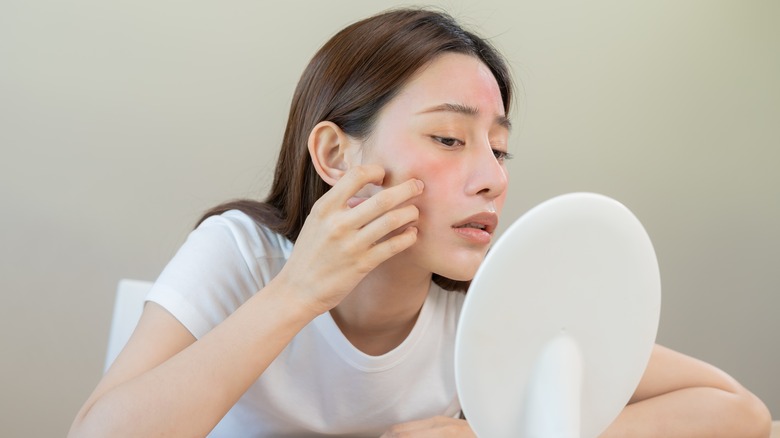How To Choose Your Skincare Routine Based On Where You Live
We may receive a commission on purchases made from links.
To say that the skincare industry is alive and well is an understatement. Skincare is everywhere, from every drugstore and Sephora to Ulta Beauty to mom-and-pop shops with a beauty aisle. With so many options and brands, of course, comes an overwhelming element of chaos — it's incredibly difficult to know what products will work best for your skin. Knowing where to start can even feel impossible, given the plethora of options. If you're into the skincare scene, you likely know that specific skin type — dry, oily, combination, acne-prone, etc. — is a defining aspect that can dictate what products are right for you. But did you know that climate is another factor you should consider when shopping for a new cleanser or moisturizer?
We hate to add yet another element to your overflowing plate of skincare needs, but thinking about your environment and the weather you're exposed to daily is significant when shopping for your skin. Someone living in sunny Southern California will likely need a hydrating moisturizer and long-lasting sunscreen to beat the heat. In contrast, people in the city should be keenly aware of pollutants and keep their skin as clean as possible. So, we've dissected the following information into climate-based suggestions, giving everyone from the hikers and snowboarders of the mountains to the sunbathers in Florida the correct options for their skin — get ready to take some notes.
If you're up in the mountains, ozone protection is important
The mountains are calling, and you might be the lucky person to pick up the phone. Suppose you find yourself in the gorgeous ranges for vacation or live at a higher altitude permanently. In that case, you should tailor your skincare routine to address potential dryness and ozone issues. Dr. Audrey Kunin told The Zoe Report of mountain living that the climate at high elevation is often dry and lacks the ozone protection than those at sea level experience. As such, there are specific skin-related issues to look out for.
"[Mountain living] can lead to skin dryness and irritation (think: redness, itchiness, and sensitivity)," Dr. Kunin said, further explaining that being high up in the mountains also results in less protection from the sun's UV rays. Dr. Erin Ilyas additionally noted that those living in snowy mountain climates can experience as much as two times the UV exposure when surrounded by fresh snow, as the fluffy white surface can harshly reflect the sun's rays.
As a result, Dr. Marina Peredo suggests those living in mountainous regions use soothing and hydrating skincare products with thick consistencies to lock in the skin's moisture. Skincare ingredients such as evening primrose and oatmeal are great options, and even if it's snowy winter, you should never skip out on SPF.
Lucky to experience mild weather? Keep your skincare simple
If you're one of the few fortunate people to live in a climate that's consistently 75 degrees and sunny, you might not consider the weather when considering your skincare. However, even if the sun is shining and the temperature stays pleasant, you should still pay attention to the products you put on your skin. As noted by Seattle Refined, temperate climates boast the "most balance" for the skin, allowing your complexion to "relax" as it's not regularly adjusting to wavering conditions.
When it's cloudy outside, it seems justified to skip the sunscreen. However, this should absolutely not be your approach, and a good SPF should be an aspect of your skincare regimen. Rainfall and windy conditions can dehydrate the skin, so while it might not scream winter weather all the time in your area, it's still essential to anticipate drying conditions. Allergens and pollutants are their own beast, so you should still be mindful of keeping your skin clean and avoiding makeup.
Suppose you're looking for some clean, balancing skincare products. In that case, some of our favorites include kale and spinach green tea cleanser from Youth To The People, triple serum SPF 40 tinted sunscreen from Ilia (great if you still want a little bit of coverage), and vitamin C serum from The Inkey List (via Sephora).
If the weather is all over the place, moisture is key
Our friends on the East Coast know the struggle all too well — it's blisteringly hot in the summer, crisp in the autumn, bitterly cold in the winter, and finally mild in the spring. That's a lot of weather to keep tabs on, and one person can't be expected to switch up their entire skincare regimen every three to four months to keep up. If you live in a climate that genuinely does experience all four seasons and brings with it a rollercoaster of weather-related patterns, you likely have experienced some of the following: cracked and chapped skin, eczema, rosacea, and general skin discomfort, according to Dr. Erum Ilyas.
"Dry skin can trigger itching, which can trigger a skin breakdown, which can ultimately lead to infection or cellulitis," Dr. Ilyas told The Zoe Report. "Think of cracks in the skin like the walls of your house. If you let cracks develop in the walls of your home, it's only a matter of time before it's impacted by the environment."
So how do you combat such difficult skin conditions? By keeping your skincare routine packed full of goodness. Dr. Ilyas recommends using a hyaluronic serum and a moisturizer, as the combination will pull in moisture and lock it into the skin. Glycolic acid cleansers and products are also good to keep in your medicine cabinet, as the ingredient will help temper oil production during the hot, humid months.
Hot and sticky outside? Don't skimp out on moisturizer
When you're getting ready for the day and step out of the front door, only to feel as though you're walking into a bowl of soup thanks to the drenching humidity, you know it will be an unbearable day. To our friends in New York, Philly, Florida, and the South, describing a hot and sticky summer is like saying the sky is blue — it's always humid, and the last thing you want to feel is even sweatier. It might sound counteractive to incorporate a good moisturizer into your skincare routine when it's so wet outside. Why do so when it's a million degrees outside? Dr. Caren Campbell told Insider that you still have to prioritize skin moisture even if you live in a humid climate.
"You are more likely to be exposed to more of the sun's harmful rays, which can age your skin and cause DNA damage, ultimately resulting in skin cancer," Campbell said, recommending that people who live in hot and humid climates stick to a light lotion — a water base is preferable to an oil base — with SPF.
Dr. Campbell also highlighted the importance of hyaluronic acid, as its light but moisturizing impacts easily face down heat and humidity. We also think that a face spray — like the Hydro Grip makeup spray from Milk – is a perfect addition to keep your skin feeling fresh.
Mature skin needs hydration no matter the weather
Repeat after us: hydration, hydration, hydration. That is the overwhelming key to maintaining youthful, glowing skin, and the ladies who have reached their golden years will be the first to tell the 20-somethings surrounding them that a good moisturizer and a fail-proof SPF are the two products that must be in your skincare arsenal. But, how should one care for mature skin when considering the climate around them? According to Dr. Marla Diakow of the Schweiger Dermatology Group, the climate only impacts the skin so much after a certain age — no matter if it's hot, dry, cold, humid, or windy, keeping the skin moisturized and armed with a good product is critical.
"The skin becomes drier and thinner with more laxity," Diakow told New York Magazine, further explaining that an effective skincare routine should consist of "products that strengthen and thicken the dermis, provide moisture retention and barrier renewal, and are not too harsh or abrasive."
With that in mind, those with mature skin should incorporate hyaluronic acid (three cheers for this wonder product), ceramides to help protect the skin's barrier, niacinamide to assist with brightness, and wrinkling-rejecting retinol. No matter the weather, this combo won't let mature skin down.
If the city calls, be wary of pollution
Raise your hand if the city bug bit you at an early age. There's just something about the hustle and bustle of the city that is irresistible to some. And while others can't wait to get back into the countryside for some fresh air, others make the city their home for years, if not a lifetime. If you find yourself transforming into a city dweller, there are some things that you absolutely should be aware of. One, public transportation is the way to go. Two, you should always carry some personal protective keychain with you. And three, your skincare routine should help rid your skin of city pollutants. As noted by Simple Skincare, living in the city can expose your skin to some harsh factors — dirt, small debris from construction, pollution, smoke, etc. — and you should prioritize some products amid your wind-down routine.
If you're a commuter, you should take some precautionary measures and invest in an anti-pollution mask (especially if you ride your bike). Switch out your on-the-go powder compact with oil blotting sheets; that way, you can avoid layering more product onto your skin. Lastly, wash your face with a gentle cleanser when you get home from a day out.
You can incorporate your regular skincare routine based on your complexion's needs. Still, you might consider including a vitamin E or B sheet mask now and then so that your skin can absorb some anti-city goodness.
Acne-prone skin should be cared for no matter the climate
Many among us deal with acne daily. No matter the climate you're in — hot, cold, windy, snowy, sunny, you name it — those pesky bumps never seem to leave you alone. And while someone with acne and oil-prone skin might think that using a face oil or moisturizer is antithetical to the pimple-fighting war, we're here to tell you that no matter the weather, you should be prioritizing moisture and inflammation-fighting products. As noted by Healthline, there are a few different ways in which acne can present itself. Noninflammatory acne refers to blackheads and whiteheads, those pesky pimples that require popping. And while an ill-timed zit is never fun, inflammatory acne — think cysts, painful lumps, etc. — is cause for skin concern.
As we're on the topic of climate and where you live, your environment can contribute to your acne. Acne tends to thrive when bacteria builds up on the skin, so if you're in a particularly humid climate or not drinking enough water in sunny SoCal, your skin could be acting up.
You should focus on some key products and practices regarding skincare. Wash your face morning and evening (and after you sweat significantly), and incorporate non-comedogenic products into your routine. Do your best not to pick or pop anything, and try to see a dermatologist when you can.
If you're in a warm and dry climate, hydration is key
So let's recap — we've covered the mountainous regions, the East Coast's fluctuating climate, the city's skin threats, and the hot and sticky summer status. And while the rivieras of the world (think the California coast and the gorgeous French beaches) experience the milder weather we discussed earlier, we have to get into the nitty gritty of desert living. Suppose you're out in the Mojave desert, Arizona, New Mexico, or Texas, and experience the arid conditions of three-digit heat and 0% humidity. In that case, your skin has felt some impact. When it's that hot outside, your skin can feel several sensations — the heat can bring a tightness to the skin. The sun beating down on your forehead can cause serious burns if you're not careful, and keeping a bottle of water on your person is key.
As far as your skincare regimen is concerned, you'll need to focus on internal and external hydration. Dr. Caren Campbell told Insider of this particular climate, "If you live in the desert, you are even more likely to suffer from dry skin, as the lack of water in the air causes more moisture to evaporate from your skin."
We recommend using a concentrated moisturizer like the Jet Lag Mask from Summer Fridays (via Sephora) to combat these impacts. This product will lock in moisture without clogging your skin — a win-win.
If the wind is howling, you've added another layer of skincare needs
This is for our friends in the windy city of Chicago or wherever the breeze is howling more than usual. If it's consistently windy in your neck of the woods, it's essential to take care of your skin and give it that little extra barrier — the proper care can go a long way. Windy conditions can not only dry out your skin, but can throw dirt into your face — not dissimilar to our city dwellers, people who live in windy climates should make sure to deep clean their skin as dust, pollutants, and whatever else the wind decides to pick up can impact your own body's barrier.
In addition to the skincare routine you have mastered for your skin type, there are a couple of additives you should consider to help combat windy consequences. As noted by Girl Talk HQ, these extra steps include an aloe vera moisturizer, a coconut moisturizer, and a coffee scrub. Aloe vera will help soothe irritated skin and is perfect if your complexion gets particularly irritated by windy conditions. A coconut moisturizer will bring balance and hydration back to your face, while a coffee scrub deep cleans your skin and guards it against harsh conditions.
Be careful of flaky skin if your winters are chilly and dry
Cold temperatures and winter conditions can do a number on your skin, and this doesn't shock anyone who has survived the months of October to March in the midwest. Conditions such as eczema, psoriasis, and chapped skin can increase with cold temperatures. The dropping thermostat can indicate that your skin will soon be dry, cracked, and craving some intense moisture.
Dr. Caren Campbell explained to Insider that creams will work better on the skin than lotions in this scenario. You'll want to look for an oil-based rather than water-based product, and you might even want to stick to the tried and true products in the drugstore, such as Aquaphor or Vaseline. You'll also want to seek out skincare items that include ceramides, and make sure to extend this skincare to your entire body too. The last thing you want is cracked hands, elbows, and lips.
Some products that should definitely be on your radar include the rose and hyaluronic deep hydration moisturizer from Fresh, the honey halo ultra-hydrating ceramide moisturizer from Farmacy, and the barrier and triple lipid-peptide face cream from Skinfix (via Sephora).










